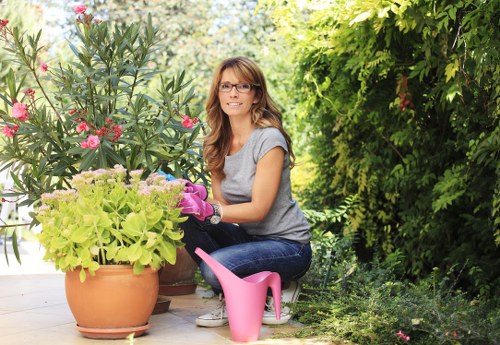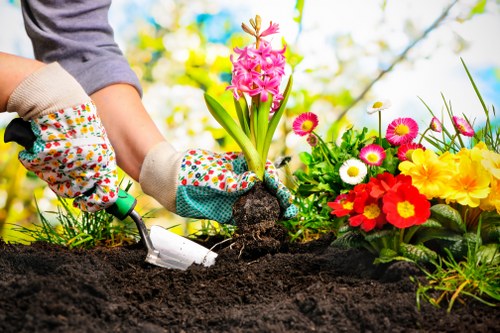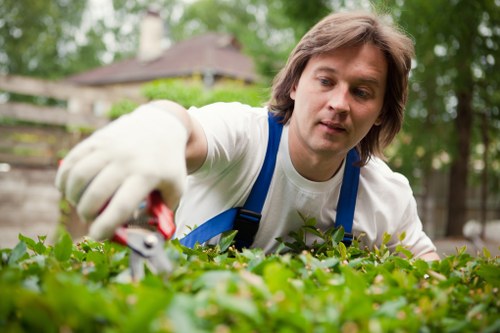Effective Driveway Algae Removal in Reading

Algae growth on driveways is a common issue, especially in damp climates like Reading. Not only does it make your driveway look unsightly, but it can also make surfaces slippery and potentially hazardous. Understanding the causes and solutions for algae growth can help you maintain a clean and safe driveway.
Algae thrive in moist environments with shade and limited sunlight. Driveways in Reading often receive limited sunlight due to nearby trees and buildings, creating the perfect conditions for algae to flourish.
Regular maintenance and prompt removal of algae are essential to prevent permanent damage to your driveway. Ignoring the problem can lead to increased repair costs and the need for more intensive cleaning methods in the future.
Understanding Algae Growth on Driveways

Algae are simple, plant-like organisms that absorb moisture and nutrients from their environment. On driveways, they typically appear as green, black, or brown patches that can spread rapidly.
The presence of algae is not only a cosmetic issue but can also indicate underlying moisture problems. Persistent dampness can weaken the driveway's surface, leading to cracks and other structural issues over time.
Different types of algae may require different removal approaches. Identifying the specific type of algae can help in selecting the most effective treatment method.
Methods for Driveway Algae Removal

There are several effective methods for removing algae from driveways in Reading. Choosing the right method depends on the extent of the growth and the driveway material.
1. Pressure Washing
Pressure washing is a popular and efficient way to remove algae from driveways. The high-pressure water jet removes algae and other debris without the need for harsh chemicals.
2. Chemical Treatments
Chemical solutions like bleach or specialized algae removers can effectively kill and remove algae. It's important to use these products carefully to avoid damaging the driveway surface.
3. Natural Remedies
For those who prefer eco-friendly options, natural remedies such as vinegar or baking soda solutions can also help eliminate algae growth.
Preventing Future Algae Growth

Preventing algae from returning to your driveway involves reducing moisture and increasing sunlight exposure.
- Trim surrounding vegetation to allow more sunlight to reach the driveway.
- Ensure proper drainage to keep the driveway dry.
- Seal the driveway surface to prevent moisture penetration.
- Regularly clean the driveway to remove organic matter that algae feed on.
Implementing these preventive measures can significantly reduce the likelihood of algae returning, keeping your driveway clean and safe.
Choosing Professional Algae Removal Services in Reading

While DIY methods can be effective, sometimes professional help is necessary, especially for extensive algae growth or sensitive driveway materials.
Professional driveway algae removal services in Reading offer expert knowledge and advanced equipment to ensure thorough cleaning without causing damage to your driveway.
When selecting a service provider, consider their experience, customer reviews, and the methods they use to ensure they align with your needs and environmental considerations.
Local Areas Surrounding Reading for Driveway Algae Removal
Driveway algae removal services in Reading are also available in nearby areas, ensuring that residents across the region can maintain clean and safe driveways.
- Tilehurst: Located just west of Reading, Tilehurst benefits from local services that understand the area's specific climate and conditions.
- Woodley: Known for its residential neighborhoods, Woodley residents can access efficient algae removal solutions tailored to their driveways.
- Whitley: This area offers proximity to Reading's central services, providing quick and reliable algae treatment options.
- Earley: Situated southeast of Reading, Earley enjoys specialized services that cater to a variety of driveway materials.
- Sonning: A picturesque area with stone driveways, Sonning requires gentle yet effective algae removal methods to preserve the driveway's integrity.
- Winchester: Although slightly farther, Winchester residents can still benefit from Reading-based algae removal experts.
- Bracknell: South of Reading, Bracknell offers comprehensive services for commercial and residential driveway maintenance.
- Wokingham: With its expansive residential areas, Wokingham relies on nearby Reading professionals for algae control.
- Goring-on-Thames: This scenic locale benefits from algae removal services that maintain driveways amidst lush surroundings.
- Henley-on-Thames: Famous for its rowing events, Henley-on-Thames ensures clean driveways with expert algae treatment.
- Crowthorne: Offering a mix of modern and traditional driveways, Crowthorne utilizes adaptable algae removal solutions.
- Emmer Green: Emmer Green residents have access to personalized algae removal services tailored to their unique driveway needs.
- Purley on Thames: This area’s driveways, often bordered by greenery, benefit from regular algae maintenance services.
- Crowthorne: Further ensuring comprehensive coverage, services here address both minor and severe algae issues effectively.
Maintenance Tips to Keep Algae at Bay

Maintaining your driveway to prevent algae growth involves regular upkeep and mindful practices.
Here are some essential maintenance tips:
- **Regular Cleaning**: Sweep your driveway frequently to remove organic debris like leaves and dirt that promote algae growth.
- **Improve Drainage**: Ensure water flows away from the driveway to minimize moisture accumulation.
- **Apply Sealants**: Use driveway sealants to create a protective barrier against moisture and organic pollutants.
- **Increase Sunlight Exposure**: Trim back overhanging branches and shrubs to allow more sunlight to reach the driveway surface.
- **Use Appropriate Materials**: Choose driveway materials that are less conducive to algae growth, such as concrete or treated pavers.
Benefits of a Clean Driveway

A clean driveway not only enhances the curb appeal of your home but also ensures safety and longevity of the driveway surface.
By regularly removing algae, you prevent slippery surfaces that can cause accidents. Additionally, maintaining a clean driveway reduces the wear and tear caused by persistent moisture and organic matter.
Furthermore, a well-maintained driveway can increase your property’s value and create a welcoming impression for guests and visitors.
Eco-Friendly Algae Removal Solutions

For environmentally conscious homeowners, eco-friendly algae removal methods are available that minimize chemical usage and environmental impact.
Natural remedies like vinegar, baking soda, and hydrogen peroxide can effectively kill algae without harming surrounding plants or soil.
Hiring professionals who use green cleaning products ensures that algae removal is both effective and sustainable, aligning with eco-friendly practices.
Seasonal Considerations for Algae Control

Algae growth can vary with the seasons, making it important to adjust maintenance practices accordingly.
In the wetter months, increased moisture can lead to more rapid algae growth. Implementing preventive measures during this time is crucial.
During drier seasons, focus on maintaining cleanliness and sealing waterways to prevent moisture buildup.
Common Mistakes to Avoid

When attempting to remove algae, certain mistakes can hinder effectiveness and potentially damage your driveway.
- **Using Harsh Chemicals**: Overusing strong chemicals can erode driveway surfaces and harm surrounding vegetation.
- **Ignoring Safety Precautions**: Failing to wear protective gear can lead to injuries or skin irritation.
- **Insufficient Cleaning Frequency**: Only tackling algae once it’s severe can make removal more difficult.
- **Not Addressing Underlying Issues**: Focusing solely on algae removal without fixing moisture problems can lead to recurring growth.
By avoiding these common mistakes, you can ensure a more effective and safe algae removal process.
Conclusion

Driveway algae removal in Reading is essential for maintaining both the appearance and safety of your property. With a variety of methods available, from DIY solutions to professional services, you can effectively tackle algae growth and prevent its return.
By understanding the causes, implementing preventive measures, and choosing the right removal strategy, you can enjoy a clean and durable driveway all year round.
Don’t let algae diminish the beauty and functionality of your driveway. Take proactive steps today to ensure a pristine and safe outdoor space for your home.
Frequently Asked Questions

1. How often should I clean my driveway to prevent algae growth?
Regular cleaning, at least once every few months, helps prevent algae buildup. In areas with high moisture, more frequent cleaning may be necessary.
2. Can I use bleach to remove algae from my driveway?
Yes, bleach is effective in killing algae. However, it should be used cautiously to avoid damaging the driveway or surrounding plants. Always follow the manufacturer's instructions.
3. Are there eco-friendly options for algae removal?
Absolutely. Natural solutions like vinegar, baking soda, and hydrogen peroxide are effective and environmentally friendly alternatives to chemical cleaners.
4. When is the best time of year to perform algae removal?
The best time is during dry seasons when you can address moisture issues more effectively. However, algae can appear year-round, so regular maintenance is key.
5. Should I hire a professional for algae removal?
For extensive algae growth or if you’re unsure about the best removal method, hiring a professional can ensure effective and safe treatment.


